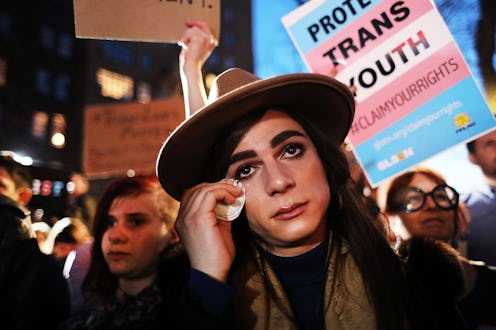Life
This Study Shows How Badly Discrimination Affects Latinx Transgender People

Despite massive inroads, like the history-making election of politician Danica Roem to the Virginia statehouse on Nov. 8, transgender people in the United States face enormous amounts of discrimination, in nearly every sector — and this discrimination is compounded for trans people of color. A recent report has found that Latinx trans folks in the U.S. experience worse outcomes than other groups when it comes to employment, housing, health, and more. Though the experience of identifying as Latinx (which is distinct from Hispanic) encompasses a large number of racial identities, Latinx and Hispanic folks in this country still comprise a marginalized minority, especially in today's political climate.
The report was collated from data produced by the National Center for Transgender Equality in its 2015 U.S. Transgender Survey, the biggest attempt yet to quantify the transgender experience in America. It received survey answers from 27,715 respondents in every state, looking at areas from employment to housing to poverty. Now, the NCTE has combined forces with the TransLatin@ Coalition to examine the specifics of the data as it relates to the Latinx transgender community.
In the year and a half since the Pulse Nightclub shooting, where 90 percent of the victims were Latinx, new attention has been focused on the particular experience of being a part of the queer Latinx community in America. And the new study shows that Latinx transgender people in particular are seriously vulnerable.
The Realities Of Discrimination In The U.S.
"Every day, transgender and gender non-conforming people bear the brunt of social and economic marginalization due to discrimination based on their gender identity or expression," the NCTE said in its first survey of attitudes towards transgender people across the U.S. in 2011, the National Transgender Discrimination Survey. "Too often, policymakers, service providers, the media and society at large have dismissed or discounted the needs of transgender and gender non-conforming people, and a lack of hard data on the scope of anti-transgender discrimination has hampered the work to make substantive policy changes to address these needs." And the new data shows just how important race and ethnicity are in analyzing the numbers.
According to the work of the NCTE and TransLatin@, 21 percent of Latinx respondents were unemployed, compared to transgender employment levels in general (15 percent), and the overall unemployment rate of the Latinx community in the U.S. (7 percent). 31 percent had experienced homelessness, 14 percent in the past year, because of being transgender, while 45 percent said they had "experienced serious psychological distress" in the month before the survey was taken. 1.6 percent of transgender Latinx people were living with HIV, five times the national average, and 48 percent reported surviving sexual assault in their lifetime, 14 percent in the last 12 months, which was marginally higher than the rest of the transgender community. 43 percent were living in poverty, compared with 29 percent of all transgender respondents and 18 percent of all Latinx people in the U.S..
The NCTE called these findings evidence that Latinx transgender people face "deeper and broader forms of mistreatment in many of the most basic elements of life" than other communities. So what lies behind the serious discrimination facing transgender Latinx folks?
Why Is This Discrimination So Rampant?
Insight into the lives of transgender and gender-nonconforming Latinx people in America can reveal truths under the surface. Dante Alencastre, the filmmaker behind the documentary Raising Zoey, told the Human Rights Campaign that part of the struggle of Latinx transgender people is cultural. “I am very proud to be Latino," he said, "but as part of this community I must recognize that our culture is still full of patriarchal traditions. A vast part of our society does not embrace the LGBTQ community." Structures of oppression, from anti-Latinx racism to anti-LGBTQ feelings in Latinx communities that cause transgender people to be ostracized, combine in very toxic ways for transgender Latinx people. They're desperately in need of support systems and better opportunities, but it'll take more research to isolate the factors that make life so hard for the Latinx community in particular.
While Orlando shocked and horrified the world, the lives of transgender Latinx women and other transgender women of color encounter violence every day; the HRC's list of transgender people murdered in the U.S. in 2016 is 91 percent transgender women of color. But discrimination goes beyond violent crimes. As this study shows, it infiltrates every aspect of everyday life, and the hardships faced by Latinx transgender people are on a larger scope than researchers may have previously imagined.